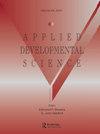利用批判性媒体素养和青年主导的研究促进黑人青年的社会政治发展:来自我们声音的策略
IF 1.5
3区 心理学
Q3 PSYCHOLOGY, DEVELOPMENTAL
引用次数: 0
摘要
在这篇论文中,Nkemka Anyiwo博士与黑人青年分享了“我们的声音”项目的成果。该项目的目标是通过磨练年轻参与者批评媒体形象的技能,促进他们的社会政治发展。批判性媒体素养似乎是批判性教育学的一种表现,许多人可以追溯到巴西教育家保罗·弗雷尔的工作(Friere,2000;McLaren和Leonard,1993年)。批判性教育学为一系列利益相关者的工作提供了信息,这些利益相关者对促进自由和社会正义的教育体验感兴趣。Velma McBride Murray和Riana Anderson博士编辑的《应用发展科学杂志》特刊旨在引起人们对发展科学中社会正义的关注。这篇特别的论文非常适合特刊,因为《我们的声音》鼓励年轻人意识到、批评和反对媒体上发布的关于黑人的不公正和虚假的图像和故事。自20世纪50年代以来,大众媒体已成为美国居民生活经历中一个更加突出的部分。媒体消费在过去10年中大幅增长,是年轻人生活中一个特别重要的方面。这包括手机使用、在线和视频游戏活动、看电视和听音乐的增加(Prot等人,2015)。当人们考虑到大众媒体的包罗万象的性质及其所促进的现存权力结构的具体化时,大众媒体的宣传功能就变得清晰起来,正如Herman和Chomsky(1988)在《制造同意:大众媒体的政治经济学》中所说。因此,批判性媒体素养似乎是参与式民主和更公正社会的必要条件。正如Kellner和Share(2007)所断言的那样,批判性媒体素养有可能促进从媒体、受众和权力之间的关系角度对各种形式的大众传播进行批判性分析。这提高了作者所采取的主动行动的重要性。然而,在这篇评论中需要注意的是,尽管作者试图批判和打破的种族和性别刻板印象确实有助于定义当今生活,但它们也先于这些对媒体可以发挥的社交功能的最新见解。美国原住民、非洲人和其他有色人种的负面形象(以及白人和男性的正面形象)过去和现在都是美国建国和发展不可或缺的一部分。出于意图,这些形象在社会运作的所有领域——艺术、宗教、教育和科学——都无处不在,因此它们会在个人身上内化和传播,人际关系和制度层面。对媒体上公布的“公正世界”或“制度正当性”信念(Jost et al.,2004)提出质疑是安义沃博士干预的第一步。鉴于宣传功能和媒体中无处不在的虚假叙事,大多数人的默认做法是相信我们所听到的。即使我们质疑叙事的真实性,对抗它也需要相当大的认知和情感努力,尤其是在叙事似乎被广泛接受的情况下。此外,如果主导叙事是我们听到的主要或唯一的叙事,我们可能不会想到另一种选择。我们倾向于不挑战制度,因为规范是接受现状,相信事情的现状就是它们必须的样子。根据制度正当性理论,那些被制度压迫的人挑战它可能更具挑战性。例如,在一项关于青少年不平等归因的研究中,来自更好的青少年本文章由计算机程序翻译,如有差异,请以英文原文为准。
Using critical media literacy and Youth-Led research to promote the sociopolitical development of black youth: Strategies from our voices
In this paper Dr. Nkemka Anyiwo shares results from the Our Voices project with Black youth. The goal of that project was to promote the sociopolitical development (SPD) of the young participants by honing their skills in critiquing media images. Critical media literacy seems to be a manifestation of critical pedagogy, a notion that many have traced back to the work of Brazilian educator, Paulo Freire (Friere, 2000; McLaren & Leonard, 1993). Critical pedagogy has informed the work of a range of stakeholders interested in the promotion of educational experiences that advance freedom and social justice. Drawing attention to social justice in developmental science is the intent of this special issue of the Journal of Applied Developmental Science, edited by Drs. Velma McBride Murray and Riana Anderson. This particular paper is a perfect fit for the special issue insofar as Our Voices encourages youth to be aware of, critique, and object to the unjust and false images and stories about Black people promulgated in the media. Since the 1950s mass media has become a more prominent part of the lived experiences of US residents. Media consumption has increased substantially over the past 10 years and is an especially important aspect of the lives of young people. This includes increases in cell phone use, online and video game activity, watching television and listening to music (Prot et al., 2015). When one considers the all-encompassing nature of mass media and the reification of the extant power structures it promotes, the propaganda function of mass media becomes clear, as Herman and Chomsky (1988) argued in Manufacturing Consent: The Political Economy of Mass Media. For this reason, critical media literacy would seem to be an imperative for participatory democracy and a more just society. As Kellner and Share (2007) assert, critical media literacy offers the potential to facilitate critical analysis of the various forms of mass communication in terms of the relationships among media, audiences and power. This elevates the importance of the type of initiative undertaken by the author of this manuscript. However, it is important to note in the context of this commentary that, while the raced and gendered stereotypes that the author seeks to critique and disrupt do help define present day life, they also precede these more recent insights into the socializing functions that media can play. Negative characterizations of Native Americans, Africans and other people of color (and positive images of Whites and men) were and are integral to the founding and development of the US. By intent, such images were ubiquitous in all areas of societal functioning—the arts, religion, education and the sciences—so that they would become internalized and enacted at the individual, interpersonal and institutional levels. Contesting the “just world” or “system justification” beliefs (Jost et al., 2004) promulgated in the media is the first step in Dr. Anyiwo’s intervention. In light of the propaganda function and the omnipresence of false narratives in the media, the default for most people is to believe what we’re told. Even if we question the veracity of the narrative, fighting against it requires considerable cognitive and emotional effort, especially if the narrative seems to be widely accepted. Furthermore, if the dominant narrative is the main or only one we’ve heard, an alternative may not occur to us. We tend not to challenge the system because the norm is to accept the status quo, to believe that the way things are is the way they have to be. According to system justification theory, it may be even more challenging for those oppressed by the system to challenge it. For example, in a study of adolescents’ attributions for inequality, youth from better
求助全文
通过发布文献求助,成功后即可免费获取论文全文。
去求助
来源期刊

Applied Developmental Science
PSYCHOLOGY, DEVELOPMENTAL-
CiteScore
12.00
自引率
2.60%
发文量
23
期刊介绍:
The focus of this multidisciplinary journal is the synthesis of research and application to promote positive development across the life span and across the globe. The journal publishes research that generates descriptive and explanatory knowledge about dynamic and reciprocal person-environment interactions essential to informed public dialogue, social policy, and preventive and development optimizing interventions. This includes research relevant to the development of individuals and social systems across the life span -- including the wide range of familial, biological, societal, cultural, physical, ecological, political and historical settings of human development.
 求助内容:
求助内容: 应助结果提醒方式:
应助结果提醒方式:


